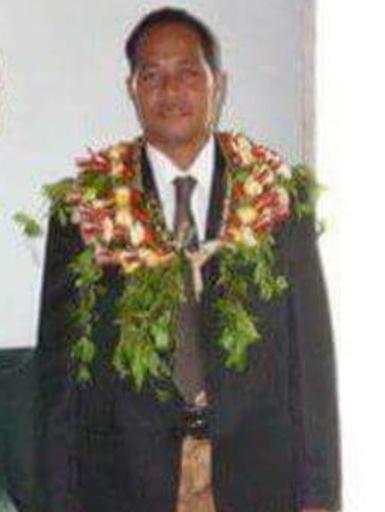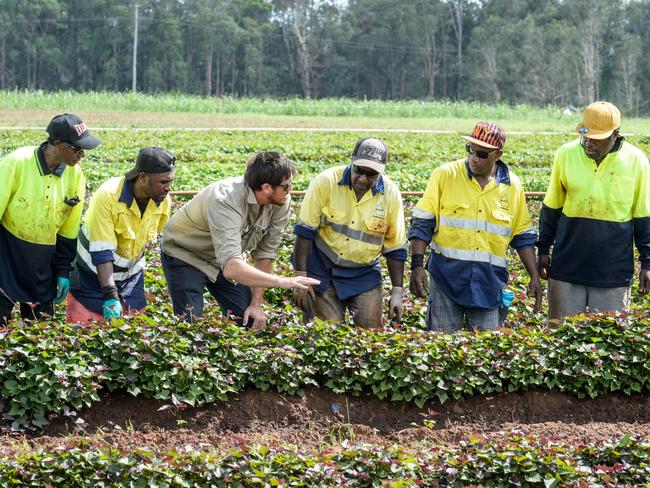Seasonal Workers Program under threat after Pacific Islander deaths
A LABOUR-hire scheme vital to a Queensland industry could be axed after the deaths of 12 foreign workers amid claims of exploitation and slave-like conditions.

QLD News
Don't miss out on the headlines from QLD News. Followed categories will be added to My News.
PACIFIC Island nations are threatening to axe a labour hire scheme vital to Queensland’s horticulture industry after the deaths of 12 foreign workers amid claims of exploitation and slavery-like conditions.
Twelve Pacific Island workers have died in Australia over the past five years while on the Federal Government-run Seasonal Worker Program which was designed to alleviate labour shortages for Australian farmers struggling to find staff to pick and pack fruit and vegetables.
It’s claimed extreme neglect of the Pacific workers contributed to some of the deaths with allegations many were living in squalid conditions, being underpaid and unable to feed themselves properly while working long hours in sweltering conditions.
Under the Department of Employment-run program farmers and labour-hire contractors are licensed to be Approved Employers, and can bring the Islanders in on a special work visas to work in regions with labour shortages.
Senior officials from many of the nations are threatening to axe the program if more worker lives are lost, a move which could damage Australia’s horticulture industry and the Pacific Islanders who rely on the program to support their families.

A special investigation by The Weekly Times and The Courier-Mail can reveal:
● Seven of the 12 Pacific Islanders who were on the Seasonal Worker Program died in the past 13 months, seven of the twelve deaths were in Queensland.
● Several of the men who died lived in squalid conditions, including caravans and illegal shipping containers, were underpaid and struggled to feed themselves.
● The Queensland Coroner is investigating six of the deaths, and the Queensland workplace regulator is investigating the most recent death which occurred on a farm at St George.
● The Federal Government was warned 16 months ago of problems with certain employers on the scheme, some of which employed workers who died.
Twelve men have died since the program began in 2012 plus another one during the program pilot from 2009.
By contrast, New Zealand has run a similar scheme for more than a decade and has employed four times the number of workers Australia, yet has recorded nine deaths.
A source close to the Vanuatu government said the country has threatened to pull out of the program if there were more deaths, while the Samoan Prime Minister has expressed concerns in local media about the death of a Samoan worker in Australia.
A cousin of the first man who died on the program in 2012, Vaea Mahina from Tonga, said she fought to get information including about his death, and an autopsy to find out how he died.
Telesia Lavaki, who lives in Brisbane, said she had to organise the repatriation of her 45-year-old cousin, who doctors say died of a heart attack after showing flu-like symptoms while working on a berry farm in New South Wales.
“I don’t want him to have died for nothing,” Mrs Lavaki said.
“Something needs to happen.”
In May, Tongan Sione Fifita, 22, known as Vaka, was working for a contractor at Childers when he became unwell and later died.
His family claims he was sick for about two weeks before his death, and his workmates reported he was vomiting blood but received no medical assistance until it was too late.
A lawyer for the contractor said his client was not made aware of Vaka’s illness until a Saturday and while Vaka initially refused medical treatment, he was taken to a hospital at the earliest opportunity.
“As you would be aware the unfortunate passing of Mr Vaka has been the subject of a formal inquiry from relevant authorities and while the passing of a young man is indeed a tragedy, and seems to have related to a pre-existing health condition, it seems there was no unusual features of his wellness or treatment which would bring our client under any scrutiny or the subject of any criticism for his general care and wellbeing,” the lawyer’s letter said.
Agent for Vaka’s family, Kennedy Fakana’ana’a-ki-Fualu, has been campaigning for better working and living conditions on the program and said workers were afraid to speak out about their circumstances.
“The employers insist they do as they’re told or they will never see Australia again,” he said.
“So they’re being threatened by employers and contractors that they must just do what they’re told and shut up even if they’re mistreated.”
The Salvation Army said there have been examples of extreme exploitation within the program.
Another man who died near Bowen, Paulo Kivalu, endured poor living conditions in Australia on the seasonal worker program.
Bowen support workers say Paulo was forced to walk more than 10km to get home when the bus left him behind, he was living on a diet of two-minute noodles because of the poor pay he received and was forced to drink untreated water from a nearby dam at the shipping container accommodation his employer had established.
A spokesman for the Employment Minister Michaelia Cash said the program “has robust safeguards in place to protect the rights of participating workers” and “to date no deaths have been the result of a workplace incident”.
The spokesman said changes have been made when problems have been identified, such as the introduction of safe driving workshops for seasonal workers, following a car accident which claimed the lives of three Vanuatu workers earlier this year in Northern Queensland.
“The vast majority of the more than 19,000 participants report a positive experience and are able to send earnings back home to their families and communities,” the spokesman said.
However Pacific Island community members and industry say the Australian Government needs to do more.
President of the Tongan Seasonal Workers Association Falepaini Maile wants an overhaul of the program.
“There is so much secrecy and lack of transparency and accountability in the Seasonal Worker Program,” she said.
“No one really knows what is going on.”
National Farmers’ Federation chief executive Tony Mahar said the program was important to farmers who struggled to find staff to harvest crops, a problem which had worsened following the a drop off in backpackers coming to Australia.
Mr Mahar said the NFF “has real concerns about instances of exploitation, underpayment and lack of care of employees” on the program.
“The large majority of Australian farmers are responsible, law-abiding employers who care about the welfare of their workers and who value the contribution (of) seasonal workers.”
He blamed the program’s design, saying it was more about “soft foreign aid” than helping farmers, and welcomed recently announced changes to the scheme, and a government program to get more young Australians to work on farms.
The scheme is part of the government’s aid to the Pacific Rim, in 2016-17 6,166 foreign workers arrived as part of the scheme.
Countries participating in the program include Tonga, Vanuatu, Fiji, East Timor and Kiribati.

Young, fit footballer sought better life
TONGAN rugby player Sione Vakameilalo Fifita was 22 when he arrived in Australia earlier this year as a seasonal worker.
Determined to provide for his parents in Tongatapu, Sione, known as Vaka, passed his health checks on the way out of his country as one of 6,166 Pacific Islanders who arrived in Australia to work on farms and in tourism in 2016-17 as part of the Seasonal Worker Program.
But about a month after arriving in Queensland, Vaka fell ill on April 17, while working for a contractor Brockfield Enterprises in Childers.
Agent for Vaka’s family, Kennedy Fakana’ana’-ki-Fualu said on the fifth day he had been ill, he began vomiting blood but was not taken to a doctor for another three days. By then it was too late.
The young Tongan’s health quickly deteriorated and he was moved to Bundaberg hospital and placed in an induced coma before being flown to the Royal Brisbane Hospital where he died on May 4.
Kennedy said more than six months later the cause of death was still unknown with a pathologist report yet to be finalised.
“The hospital staff think an external bacteria or virus may have got in and attacked his system,” Kennedy said.
Kennedy said he had been told Vaka was living in cramped conditions with other seasonal workers who have complained of large wage deductions and cramped accommodation, including a caravan with holes in the roof that leaked when it rained.
A lawyer for the company said his client was not made aware of Vaka’s illness until a Saturday, and while Vaka initially refused medical treatment, he was taken to a hospital at the earliest opportunity.
“As you would be aware the unfortunate passing of Mr Vaka has been the subject of a formal inquiry from relevant authorities and while the passing of a young man is indeed a tragedy, and seems to have related to a pre-existing health condition, it seems there was no unusual features of his wellness or treatment which would bring our client under any scrutiny or the subject of any criticism for his general care and wellbeing,” the lawyer’s letter said.
The Weekly Times-Courier Mail investigation can reveal the Tonga Australian Seasonal Worker Association sent a 120-page document to the Department of Employment outlining claims of mistreatment and underpayment of workers, including some who were employed by Vaka’s employer, Brockfield Enterprises.
These allegations included the company housing some workers in dilapidated caravans and charging $140 a week per worker and paying piece rates which were below minimum wages to workers.
“In Tonga they promote it as if it is a great opportunity and people fall for it,” Kennedy said.
“They don’t realise it is really hard work and you’re out in the sun, you’re mistreated, you don’t eat well and you don’t sleep well.
“Both Australian and Tongan governments must do something to avoid more people being lost.
“We didn’t have to lose all these people. How many more lives are we going to lose before governments act?”
The Queensland coroner confirmed Vaka’s death was being investigated.
A spokesman for the Department of Employment said any allegations of mistreatment by approved employers under the program, were “thoroughly investigated” and it also looked into all TASWA allegations, and found ”a large proportion of allegations were not substantiated”.
He died with $900 to his name
TONGAN farmer Vaea Mahina came to Australia in September 2012 on the Seasonal Worker Program to make a better life for his wife and their eight children.
Just months later, on December 7, Mr Mahina collapsed on the NSW berry farm where he was working.
Mr Mahina was in Australia on the Government-run Seasonal Worker Program, and became one of the first Pacific Islanders to die on the program, which started in 2012.

After two and a half months of work, the 45-year-old father-of-eight had just $900 in his bank account when he died, his cousin Telesia Lavaki claimed.
Mr Mahina’s pay slips from his employer, Owen Pacific Workforce, seen by The Weekly Times-Courier Mail, shows in one week he earnt $379 but took home just $53 after deductions by his employer.
Mrs Lavaki said in the week he earnt a little over $50, he sent most of this home, leaving him with $10 a week to live and he struggled to buy adequate food.
His pay slips also reveal he was charged:
$120 for accommodation a week, which Mrs Lavaki claims was a converted shipping container he shared with up to eight other men, and $77 a week for transport.
$31.50 a week for visa fees.
$17.40 a week, totalling more than $120 for “sundry expenses” which Mrs Lavaki was told paid for newspapers.
A pay slip for the period between November 26, 2012 and December 2, 2012, showed Mr Mahina’s year-to-date earnings at $5975.50 but after deductions, he received just $1471.
A company representative for Owen Pacific Workforce said its workers were housed in air-conditioned council-approved accommodation at a holiday park which was regularly inspected by the Department of Employment and is still being used today.
The spokesman said deductions taken from workers’ pay was on the advice of the then Department of Education, Employment and Workplace Relations.
The spokesman said he “immediately ceased” deducting for sundries when the Department advised against such a deduction.
Mrs Lavaki, who lives in Brisbane, had to fight for two years to receive a death insurance payout from his superannuation fund for his family.
Mr Mahina, who farmed taro, yam and pineapple at his plantation in Tonga, was found to have died from a heart attack.
Mrs Lavaki said her cousin was fit and healthy and had passed a health check in Tonga before coming to Australia, a requirement of the program.
“I think my cousin was dehydrated, his nutrition was bad from the food he was eating … I saw the photos, it’s not him,” she said.
“It’s not the person I know he was so skinny.
“He looked really, really sad.
“He was a very quiet and gentle person and he was such a handsome boy always smiling.”
She believed the employers the Federal Government approve to bring in the workers need to be better regulated.
“I don’t want him to have died for nothing,” she said.
“Something needs to happen.”
The Owen Pacific Workforce spokesman said they visited Mr Mahina’s family in Tonga, and made a donation of his “estimated earnings” to the family and later employed their oldest son.
“I felt so badly for her, farewelling her husband with the hope of a brighter future for her family only to receive the devastating news of his passing 10 weeks later,” the spokesman said.
A Department of Employment spokesman said the Seasonal Worker Program “has robust safeguards in place to protect the rights of participating workers” and every allegation raised was referred to relevant authorities.

Secrets to successful program
FOR BUNDABERG sweet potato farmer Russell McCrystal, the Seasonal Worker Program is a fundamental part of his business.
Widely regarded as one of the best approved employers on the program, Mr McCrystal reaps what he sows.
By treating his workers with respect and kindness and ensuring they have access to regular pastoral care and comfortable accommodation and living conditions, he has guaranteed himself a happy, hardworking staff keen to return each year.
“From a productivity point of view it’s great you’ve got a known team for a set amount of time and it’s good because you spend the time training and investing in them,” Mr McCrystal said.
“We became an approved employer about 12 months ago and the main reason was because we like the idea of a return workforce so that we could build a team and we weren’t dependant on itinerant workers.
“You’ve got surety to some degree that you’ve got a team and there is more incentive because you want them to come back.”
Mr McCrystal employs about 11 seasonal workers at a time to work on his sweet potato farms, and nursery which supplies plants to other farms.
He said there was a higher cost associated with employing seasonal workers, which includes employing a staff member to do administration for the workers.
“I think there’s a lot of good small-to-medium size farms in the region that could benefit from the program, but a lot are nervous or won’t take the next step just because of the administrative burden of the program,” he said.
“Because we provide a service to our customers we know our cost structures are a bit higher for what we do, so I’m always having to defend ... the fact we do have higher cost structures but we do it because we’re doing the Seasonal Worker Program to make sure we’ve got a good dedicated team so our customers benefit from consistency.
“We’re playing the long game instead of the short (one) to try save five cents here and there.”
The farmer said he was shocked by the lack of local workers willing to do the same work.
“With the program we have to test the local market and I was amazed,” he said.
“I thought we’d get some good local workers but I was honestly amazed we couldn’t attract any.”
Mr McCrystal said stopping the program, because of rogue operators, would severely impact the agriculture industry.
“If the program was stopped it would not only be devastating to us as a farm but also our workers that we commit to,” he said.
“They’re part of our team and it’s successful.
“They want to work here and our customers know we’re committed to it so it would be disappointing.”
Mr McCrystal said ensuring workers had access to regular pastoral care was crucial.
“That pastoral care is really important to get them involved in other community groups so they know there’s other people watching out for them,” he said.
“They’re not just here in work hours, they’re part of the community of Bundaberg.
“There’s a lot of other hours of the day and we can’t control all their choices — they’re individuals and they need that freedom.”


